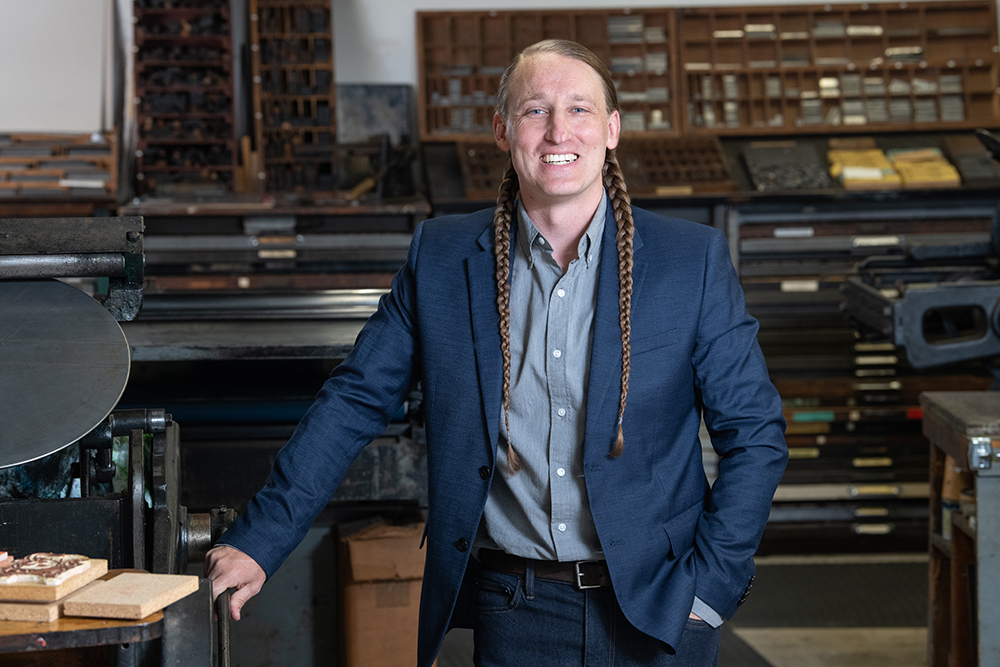Dean's Message: Fall 2021 Welcome
August 30, 2021
By Dylan Miner, Interim Dean
Residential College in the Arts and Humanities

As Interim Dean here in RCAH, I would like to welcome the 14th and 15th incoming classes to the Residential College in the Arts and Humanities (RCAH). As we begin the semester in-person, it is important to position our shared present moment in historical context to help us understand, as we do here in RCAH, “the presence of the past.”
Now that students are returning to RCAH, they will without-a-doubt find RCAH to be a kind and generous community with a diverse student-body that holds an array of intellectual, artistic, and other interests. What brings us together, however, is:
- the desire to live our learning,
- the expectation to become active and engaged agents of change,
- and the need to acquire the skills necessary to live fulfilling and successful lives.
First and second-year students returned to campus this past weekend. At the time of my writing, classes will begin tomorrow. As someone who has helped dozens — if not hundreds of students move-in over the past decade-and-a-half — I would say that move-in is a joyous time. It is an extended moment in which students and their families should celebrate. However, I know many of them have arrived on campus with both excitement and apprehension. Some of them have suffered great losses over the past year-and-a-half, and all of them have sacrificed individual endeavors for the benefit of our shared and collective well-being. They should be commended for that and—now that they are on campus—we press them to continue to think about how their individual actions will impact others, particularly as we continue to cope with the pandemic for the foreseeable future. RCAH and MSU are now the next step for incoming RCAH studentsn in what I hope will be a lifelong journey to become better, if imperfect, humxns who desire to imagine and then build better world(s).
As I prepared for the semester this weekend, I was drawn to the vast history of Michigan and, just as importantly, of the deeds and actions of generations of activists on whom I often draw inspiration. Understanding and discussing this history will enable us to make sense of the present and — just as crucially — inform us about ways to navigate towards better and more just future(s).
In 1962, the Students for a Democratic Society (SDS) gathered just outside Port Huron, a city just over 100 miles east of East Lansing, at a United Autoworkers (UAW) retreat center. They were not that unlike current RCAH students and now that dissimilar to who I was two-and-a-half decades ago. In Port Huron, these produced what came to be known as the “Port Huron Statement”. If you watched The Trial of Chicago Seven last year, you likely remember Tom Hayden (1939-2016; played by Eddy Redmayne), one of the main characters in that film. He was the individual who, by and larger, drafted the Port Huron Statement. While we can likely find faults within this document and also among student activists of that period (as the Hollywood film attests), they nonetheless use their (modest) privilege as college students to “build the world a fresh,” as Grace Lee Boggs would have it.
As we welcome two incoming classes to RCAH, the words of the Port Huron Statement continue to have resonate with us today, nearly 60 years after they were written. The statement begins, proclaiming that: “We are people of this generation, bred in at least modest comfort, housed now in universities, looking uncomfortably to the world we inherit.” Today, as we literally commence the semester, we can use this discomfort to move us to action; it can aid us in finding solidarity with and common ground with one another as a college and university community.
Moreover, the words and actions of Grace Lee Boggs (1915-2015), the brilliant Detroit-based activist, ring true today and continue to guide us on our journeys. She was an Asian-American daughter of immigrants, born in Providence who earned a PhD at Bryn Mawr College. She spent her entire life fighting for social justice. She lived to be 100 years old. Dr. Grace Lee Boggs reminds us that: “We are beginning to understand that the world is always being made fresh and never finished; that activism can be the journey rather than the arrival; that’s struggle doesn’t always have to be confrontational but can take the form of reaching out to find common ground with the many others in our society who are also seeking ways out from alienation, isolation, privatization, and dehumanization by corporate globalization.”
So, we can celebrate the return of students to MSU, particularly because we know how meaningful it is to them. At the same time, we acknowledge that it is through the journey that RCAH will both transform our students and, in turn, they will reciprocally change the world. It is here, in RCAH that they find fellow travelers and those with whom to find common ground. It is here that they, and I — and everyone who is a part of the RCAH community — actively create the world anew.
From professors and staff to community partners and fellow students, we all look forward to getting to travel along incoming and returning RCAH students in their journey at and through Michigan State University. It is my hope that over the coming years, we will all become better humxns during this process and, in turn, collectively create a more and equitable world for everyone.
Have a great semester and remember to mask up.

